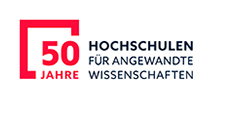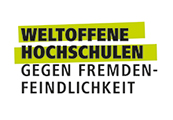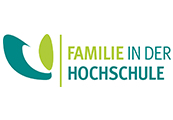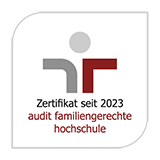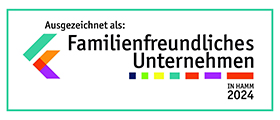Choice of Study Program and Orientation
-
Which study programs are offered at HSHL?
HSHL offers 14 bachelor’s and 10 master’s study programs.
Check out our study programs. -
I would like to know more about the study programs / I need advice.
The General Student Counselling (ZSB) is happy to answer any questions regarding your studies at HSHL:
- Deciding on a study program & general study orientation
- Contents and structure of the study program
- Application
- Financing your studies
- Living in Hamm or Lippstadt
- Special concerns, e.g. studying with a child or taking care of relatives
Make an appointment at +49 2381 8789-130 or by email to studienberatung@hshl.de.
-
Does HSHL offer any dual study program?
At HSHL you can study Mechatronics as a dual study program.
-
What is the Guest Auditor Program (Gasthörerschaft)?
The Guest Auditor is an uncomplicated and free opportunity to attend various courses at HSHL for a maximum of two semesters. This allows you to get an insight into our campus and meet professors at HSHL.
How can I attend? What do I have to do?
You can apply at any time and do not need any special requirements or language certificates. It is recommended that you start in the respective semester (March or September).As a visiting student, you cannot take any exams and do not receive a semester ticket. We can issue you a certificate of attendance.
Costs: The 1st semester is free of charge. For the following semesters, you will have to pay a fee of €100. -
Local admission restriction (örtliche Zulassungsbeschränkung) – What does it mean?
A local admission restriction ("örtliche Zulassungsbeschränkung") means that a certain number of places are available in a program for which you can apply during the application period. After the deadline, the university decides on admission according to legally defined quotas.
For more information on the admissions process, click here (Information in German). -
Admission-free study program – Will I always be admitted?
If you apply on time and submit the required documents, you will always be offered a place in an undergraduate program. Therefore, it is not necessary to apply for more than one program at a time.
Admission requirements
-
What are the admission requirements at HSHL?
To apply for a bachelor’s program at HSHL, you will need proof of the following qualifications:
- General University Entrance Qualification ("Allgemeine Hochschulzugangsberechtigung", "Abitur")
- Subject-Restricted University Entrance Qualification - according to the course of studies ("Fachgebundene Hochschulzugangsberechtigung")
Please see the information on our website.
You may also need to provide a proof of German or English language skills for admission and if you are applying for a master’s program we will require additional documents. -
Do I need a pre-study internship (Vorpraktikum) for admission?
No. HSHL does not require a specific pre-study internship ("Vorpraktikum") for admission.
Please note that the practical part of the entrance qualification for a university of applied sciences ("Fachhochschulreife") is not a pre-study internship. -
Can I study with vocational training (berufliche Aubildung)?
There are three ways to study with vocational training. The options are described here (in German). If you have any further questions, please contact the General Student Counselling.
International
-
International Educational Certificates - What do I need to know?
Applicants with international educational certificates (e.g., "Matura", "O-and A-(S-)level", "Baccalaureate") must also have their documents checked by uni-assist.
This can only be done during the official application period. Please upload the evaluation result (VPD) to the Online Portal.
More information about the general process, handling fees and required documents for uni-assist is available on uni assist's website.
If you apply from India, China or Vietnam the APS certificate is required.You need further advice on your educational certificates? Please contact the International Office.
-
VPD – What is it and how long can I use it?
VPD stands for preliminary review documentation ("Vorprüfungsdokumentation"). This document is issued by uni-assist and is required for applications with international educational certificates.
It can be used for an application to HSHL in the following year, if the admission requirements have not changed.- Which VPD do I need? The VPD must be issued specifically for your chosen study program at HSHL. A general evaluation is not sufficient.
- I have not yet received the VPD, but the deadline is coming up soon. What can I do? If you do not receive the document until the application deadline, you can use the application confirmation from uni-assist, upload this PDF document to our Online Portal and complete your application before the deadline. Once you have received the VPD, please send it to admission@hshl.de.
-
What is the language requirement?
HSHL requires a minimum level of C1 for study programs taught in German and B2 for those taught in English.
You can find an overview of the language certificates we accept here (under Language proficiency).
You do not need a language certificate for courses taught in German if you took the Abitur at a German school abroad. -
Where can I learn German?
The Language Centre offers online and face-to-face German courses at various levels for enrolled HSHL students each semester. Please contact the International Office for detailed information.
-
What is a proof of financial resources (Finanzierungsnachweis)?
The proof of financial resources ("Finanzierungsnachweis") is often required when applying for a student visa to Germany. It serves as financial security during the upcoming studies and amounts to 12,208 euros (2023) for one year.
Examples of such proof are a deposit in a blocked account or a recognized scholarship. Please contact the German embassy or consulate in your country to find out the exact requirements. You can find more detailed information here.
Application
-
How can I apply to HSHL?
You can only apply via the Online Portal. Here, you need to create an account and provide your personal details for the selected study program. You will then be informed of the next steps in the portal. You can find more information here.
Applicants with international certificates (e.g. "Matura", "O- and A-(S)Level", "Baccalaureate") must also have documents of their university entrance qualification ("Hochschulzugangsberechtigung") and language certificates checked by uni-assist. This is only possible during the official application period.
These processes take some time. It is strongly recommended that you start early!
-
Can I apply for winter and summer semester?
You can apply for a bachelor's program only in the winter semester.
Some master’s programs also open their application period in the summer semester. You can find more information here or on the website of the respective study program.
-
When can I apply?
You can find the current application periods and deadlines here.
-
How and when will I receive an admission or rejection letter?
You will be informed of your admission or rejection by e-mail. This is usually within 4 weeks of the application deadline.
-
Can I apply for more than one study program?
Yes, you can apply for both restricted and admission-free study programs at the same time.
It is not necessary to apply for more than one admission-free study program, as you will be admitted to the study program of your choice – if you meet the admission requirements. -
I am already studying at a university. How and when can I transfer to HSHL?
A transfer to HSHL is only possible for the winter semester and you need to apply for the first semester. You can find more information about the application steps here.
-
I would like to enter a higher semester at HSHL. How can I transfer my credits?
The first step is to apply for a study program at HSHL. Once you have been admitted and enrolled for the first semester you can apply for the transfer of your previous earned credit points.
For further information and application forms please contact the Examination Management. -
Do I need to pay tuition fees at HSHL?
No, HSHL does not charge tuition fees as it is a public university. Students only have to pay a semester fee each semester.
-
How much is the semester fee? How do I pay it?
Detailed information about the semester fee can be found here.
Enrollment
-
I have received my admission and I am provisionally enrolled. What happens next?
- You will receive an e-mail with the (conditional) authorisation
- The e-mail also contains your access data for myHSHL.
- Important: From this point on, the university will communicate with you via your new HSHL e-mail address.
- Download the letter of admission as a PDF from myHSHL.
- Important: In the letter of admission you will find the details for paying your semester fee
- Find out about student health insurance.
- Please note: The applicant number corresponds to the matriculation number.
- Pay the semester fee by stating your HSHL application number.
For international students
- Apply for a visa if necessary.
- Important: The visa procedure can take several months in some countries. Start your application as early as possible.
Once you have received your admission, there will be further steps to follow, which you will be informed about with your letter of admission.
-
Health Insurance – What do I need to know?
Anyone who wants to study in Germany needs sufficient health insurance at the time of enrollment. The proof of health insurance will be transmitted digitally to HSHL and you may need to provide your health insurance company with a reference number ("Absendernummer").
HSHL’s number for transmission is: H0003196.
If you take out a statutory health insurance in Germany, your health insurance confirmation will be digitally transmitted to HSHL by your insurance company.
If you have a private health insurance or sufficient insurance from your home country, please contact a German statutory health insurance company (e.g. AOK, Barmer, TK) and ask them to inform HSHL about your insurance status. You will probably need to apply for a certificate of exemption ("Befreiung von der gesetzlichen Krankenversicherung").You also need your matriculation number. You can find all the information you need in the letter of admission on myHSHL, which you can download there as a PDF. Your applicant number is your matriculation number.
Please find further information on the DAAD website.
-
I have questions about my application/enrollment – Who can help?
If you have formal questions about your application or enrollment please contact the Student Services.
-
Where can I get my certificates/copies officially certified?
Official certification is possible at any public authority or Notary. Please find detailed information here.
-
Until when can I submit my certificate of de-registration (Exmatrikulationsbescheinigung)?
If you do not have your exmatriculation certificate from your previous studies by the application deadline, you can submit it by 30 September at the latest.
Student Services will be happy to help you if you have any questions. -
My contact details have changed – What should I do?
Please contact the Student Services if your contact details change. This could be your email, home address or name.
-
I have accepted a place at another university – How do I de-register and do I get a refund?
If you decide not to accept the place at HSHL before the start of the lecture period, the full semester fee will be refunded. Please inform the Student Services by email and add your bank details.
If you decide not to continue your studies at HSHL after the start of the lecture period, you must submit two forms.
- de-registration form ("Exmatrikulationsantrag")
- form for a refund of the semester fee ("Rückerstattungsantrag").
Both forms are available at Campus Office Online. Please note that only a partial refund of the semester fee is possible after the lectures have started.
Starting your studies at HSHL
-
When do my studies begin?
The winter semester starts on 1 September. From then on, HSHL offers preparatory courses (in German only) for first semester students. Afterwards the regular lectures begin.
You can find all important dates and deadlines for the coming semesters here. -
Is there a preparatory course for my study program?
Please check here to see if there is a preparatory course for your study program.
Preparatory courses at HSHL are only offered in German. -
Are there welcome events for first semester students?
Yes! In addition to the preparatory courses, HSHL offers various lectures and workshops as well as welcome events on both campuses. Attending these events will help you to get to know the university, professors and fellow students before lectures start. You will also receive a lot of important information and advice about starting your studies.
If you are unable to attend the welcome events, please take a look at the handouts and contact the General Student Counseling or the International Office for more information. -
How do I get the student ID?
The student ID is only available digitally. You can find it at the start of your studies in the Online Portal under "Meine Studiennachweise".
Please switch to the German language to find the PDF. -
When and how can I download the semester ticket?
The semester fee includes a so-called Semesterticket NRW which you can generate yourself online after you have successfully enrolled.
You will receive an email to your student email account with further information. - I need accommodation – Where can I find information?
-
Where can I get my study plan?
The study plan will be published in the learning platform of myHSHL each semester and further information are given in the welcome event.
-
How and when do I register for modules & exams?
All times and deadlines for the current registration period for exams and modules are published here. The registration is only possible via Campus Office Online.
-
I have a child / need to care for close relative. Can I get assistance?
Yes! For example, there is the "Priority CheckIN" (PCI) that allows you flexibility and planning security:
- Check timetables in advance
- Make early and binding group selection
For more information about the requirements and other options please contact the General Student Counseling.
Relevant contact points, financial and legal support as well as HSHL offers can be found in the brochure "Studying with a child" (in German only)
For all questions concerning the topic of "Studying with family responsibilities" please contact the Office of Equal Opportunity (in German only). -
Where can I find regulations or the module manual for my study program?
All HSHL regulations can be found in the Official Notices section ("Amtliche Mitteilungen").
The examination regulations and the module manuals are in the download section on the webpage of your study program.
